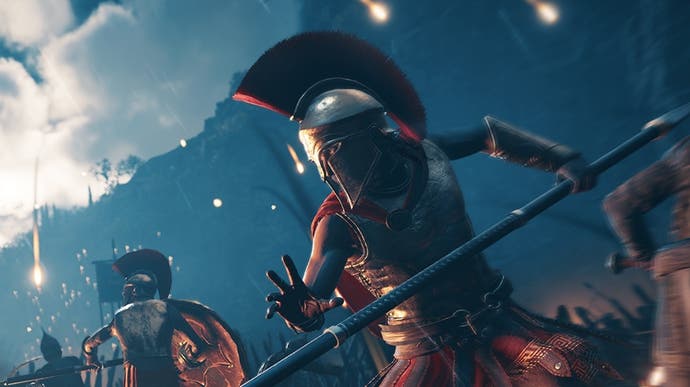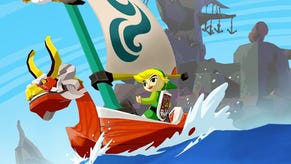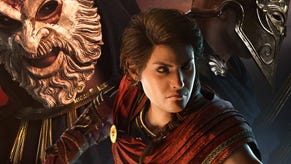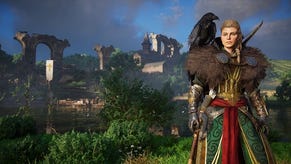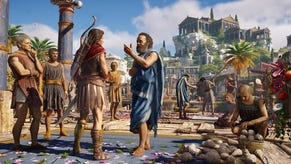Assassin's Creed Odyssey: the first eight of 100s of hours
Get you to the Greek.
There's been a lot of talk lately about how long Assassin's Creed Odyssey is - more than 100 hours, its developers say - and it's been interesting to see the response. Time was, you'd ask how long your £40 was expected to last, hear a large amount of hours and think, great - the longer the better. But for me, anyway, having less time to play games these days is certainly a thing. And I think the games we all play are more demanding of the time we have to spend with them. Perhaps demanding is the wrong word, but more and more, I feel like each game I enjoy playing is trying to be the only game I enjoy playing, with little time to play anything else.
So maybe that 100 hours number sounds great - or maybe, like me, you still have side-missions from last year's Origins sitting around to mop up. Will it really take 100 hours to finish Odyssey's core campaign? It's something I had in mind while playing the game's first eight hours at a lengthy preview session last week. It was really only just enough time to get properly bedded into Odyssey's various gameplay loops, but more than long enough for the game's brilliant story to deliver its first couple of gut punches.
Odyssey delivers some of the best writing in the series by a country mile, evident from the three hours of mid-campaign missions I played just prior to E3, but noticeable too even in the brief lead-up to the Medusa boss fight on offer at gamescom. I've been impressed by the nuance and dry humour present in Odyssey's storytelling, and in particular I've been blown away by the delivery from Kassandra's voice actor Melissanthi Mahut, who puts in a passionate performance which easily rivals that of previous franchise bests. There's a lot to work with here - Odyssey definitely lives up to its name - and I've been hugely curious to see how the game kicks off. These first few hours deal with that series-first choice of being able to pick between siblings Alexios and Kassandra to play as throughout the rest of Odyssey, and lay out the family-related drama this latest Assassin's Creed protagonist is set to deal with. The following paragraph discusses some of these events - so skip over this if you want to remain completely unspoiled.
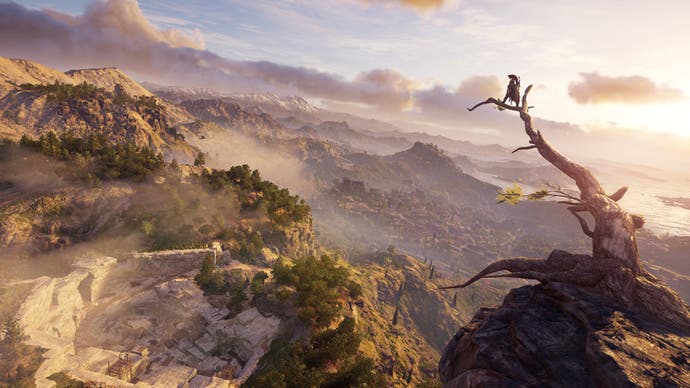
Odyssey begins with a flashback to your grandfather King Leonidas' famous battle - that one from the film and graphic novel 300 - or rather, the lead-up to it. You play as Leonidas as he leads his troops into a chest-kicking, pec rippling face-off, before the action and time period shifts forward a family generation to a young Kassandra and Alexios, albeit via a brief explanatory scene with modern day protagonist Layla. While you'll play as Kassandra (or if you really want, Alexios) through 99 per cent of your Odyssey experience, having Leonidas and Layla present from the off feels a clever way to bookend the experience. Leonidas' story explains where Kassandra came from - he is her bloodline, and the previous owner of her handy First Civilisation speartip weapon - while Layla is the modern day lens we are seeing the story through. Even as a child, Kassandra is by the far the most captivating to watch and by this point you have already made your choice who to play as, so what follows next has an awful, doomed sense of inevitability regarding the sibling you did not pick - even if it doesn't play out exactly as expected.
These various plot threads set up the game's three main narrative arcs, two of which really only kick into gear after the first eight hours I played conclude. The story of your family begins the game and runs throughout - as you uncover more about your bloodline and try to reconnect with your past - but then intersects with the other two other strands, which are better rooted into existing Assassin's Creed lore. There's the Cult of Kosmos storyline, which so far has been hinted to be a kind of moody proto-Templar organisation with similarities to Origins' baddies, the Order of Ancients. And then there's the First Civ storyline, which enables mystical elements like your speartip and that Medusa fight to take place in Ubisoft's version of Ancient Greece, all of which Layla is investigating in the modern day. There's an awful lot of story in Odyssey, then - but does it still justify 100 hours?
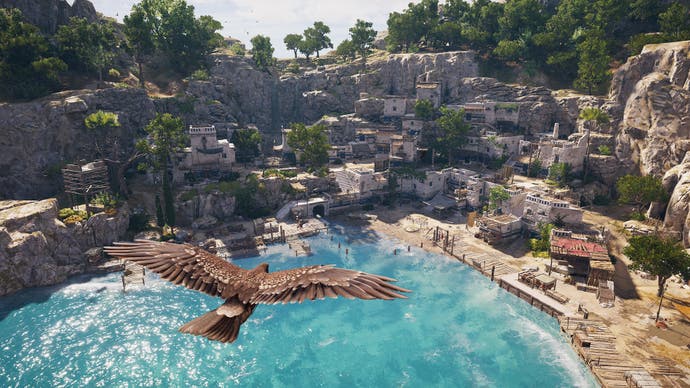
"It depends on your playstyle and what you want to accomplish," Odyssey mastermind and Ubisoft Quebec senior producer Marc-Alexis Côté told me. "There are three storylines but for most people 'finishing' the game would be completing the family storyline. It is an epic game - to use the Greek word - but we try and make every minute you spend in it valuable and growing [you] as a character. I think people will like that it has a variety of tones," he continued, "you can choose to make it funny, it has made me cry - this game has a way of creating emotions depending on the choices you make which makes my time playing it feel valuable. I hope it will be the same for you."
Part of Assassin's Creed Odyssey being enormous comes from its committed Leap of Faith into role-playing game territory. What started in last year's Assassin's Creed Origins is expanded upon here, so expect level-gated missions appearing on your map which you may at first not be able to tackle without a lot of starting over, and side-quests you'll want to complete before all that to level you up instead. Assassin's has always had a strata of missions you have to clear other bits and pieces to access, and always had side-activities to complete. The crucial part of Odyssey, I think, will be what Côté said - whether all of this time playing, getting to the next big narrative beat, feels valuable.
The game begins strongly with its introductory region of Kephallonia, an island where you have a sort-of family to look after in your role as a struggling, failing mercenary, and where you get caught up in the machinations of local thug, a one-eyed lump nicknamed The Cyclops - there's a hilarious scene with a goat - before you travel by boat to Megaris, the first properly big region, to hunt the first big target of the game. Megaris is the first of many regions where you arrive with instructions to sap the strength of its leader - it's a gameplay mechanic I saw back at E3 - and one I wonder how many times the game will ask you to repeat throughout. Taking down the region's strength is sort of a background task to the quests you find there - but it's easy to get caught up in, taking down forts to raid war resources and cut down enemy numbers to then weaken the final target in your eventual encounter.
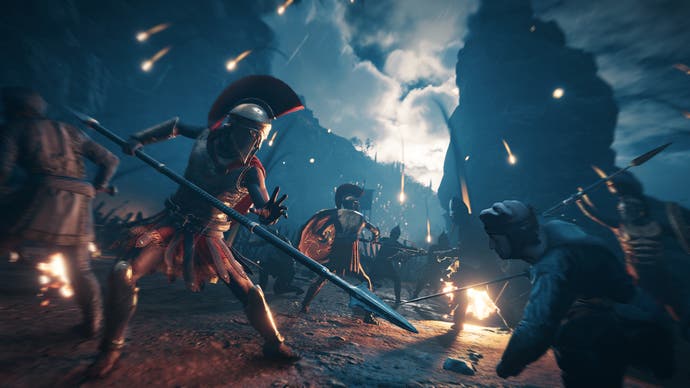
But while there a proper meaty quests here, there's still the whiff of fluff which some players will want to ignore. Most notable is Odyssey's procedurally-generated mission system, a way to continually gain XP and items via relatively cookie-cutter missions of the kind Reda the Merchant set you in Origins to encourage you to log in every day. There was nothing intrusive about the concept in the eight hours I played - I certainly didn't feel I had to complete them to hit the levelling curve - but I'm cautious to see whether I will need to engage with these at all as Odyssey progresses. They are a curious addition in general - a neverending supply of things to do designed to at least partially appear like curated content - you can be stopped on the side of the road and asked to complete one of these quests in a scene with voiced dialogue, making it feel like an important thing you should be distracted by.
"We've got 20,000 [dialogue] lines for the procedural system," Côté told me. "We try to monitor what the player is doing and provide you with a quest that could compliment what you are doing or what you have done. These quests are sometimes very useful to level up - they appear constantly, but we always try and signal them through the HUD [via] a different icon."
Perhaps it's less about requiring these missions but giving them as an option? That would be better, an option for people who don't want to gain XP in other ways, by simply exploring Odyssey's enormous and frequently beautiful world or complete side-quests for its characters. I had no trouble ignoring them while rushing through what was on offer to see the big narrative moment - one I can't talk about at all - which comes as you finally meet Megaris' big bad. In fact, I felt bad for the quests I didn't see - some of which can disappear as you move through the story, and some of which won't trigger at all if you don't fully explore.
It's clear Odyssey is going to be a commitment, but one I'm looking forward to beginning again when it arrives in a month's time. Without spoiling its story beats, it's hard to explain how good the game's writing is, without seeing Kassandra's wry smiles and impatient swears it's hard to show why I want to sign myself up for her Odyssey. There's stuff I'm not yet sold on, but more than enough heart and story that I want to give Odyssey the time I feel it'll demand.
This article is based on a hands-on day in Paris, for which Ubisoft covered travel and accommodation.
